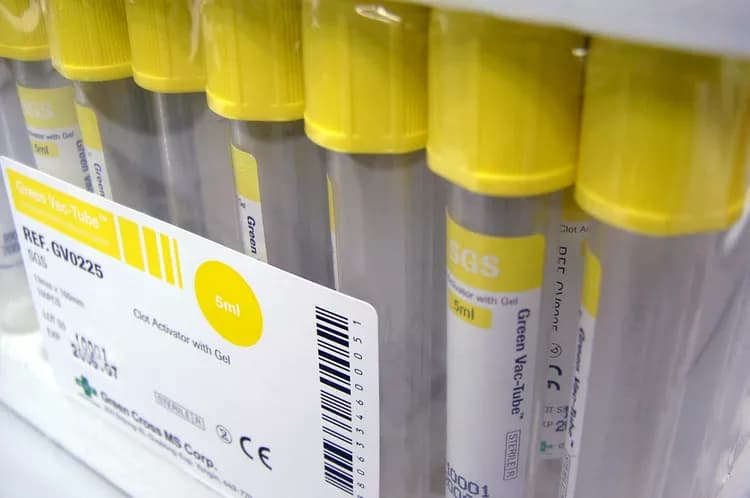What are the other Names for this Test? (Equivalent Terms)
- Activated Protein C Resistance Test
- APC Resistance Test
- Factor II 20210 Test
What is Factor V Leiden Mutation and PT 20210 Mutation Tests? (Background Information)
- Blood clotting is an essential bodily response to injury of tissue or blood vessels - the resulting hemostasis (term for the process that stops bleeding), helps in controlling bleeding. This is achieved through the actions of cells, called platelets, and proteins, called coagulation factors
- Factor V and Factor II/Prothrombin are two such coagulation factors. Any mutation (abnormal change) in these two factors, affect the clotting mechanism. Factor V Leiden and PT 20210 are two such dysfunctional forms of these proteins that can independently increase the risk of blood clot formation
- The body has normal regulatory mechanisms that keep blood clotting under check. This prevents any excess or unnecessary clot formation. Protein C is one such protein that keeps a check on coagulation
- A factor V Leiden is resistant to the action of activated protein C- hence this predisposes blood to increased clot formation. Individuals with PT 20210 mutation on the other hand, have increased amounts of a protein called thrombin, which increases their risk of developing blood clots
- Each of these mutations maybe heterozygous (an individual has one copy of a normal gene producing the normal protein and a second copy of the abnormal gene encoding the abnormal protein) or homozygous (both copies of the genes are abnormal). The risk for clotting is more in those, who are homozygous for these mutations
- Factor V Leiden Mutation and PT 20210 Mutation Tests are used to identify the presence of these mutations and also if, the individual is homozygous or heterozygous for the same
What are the Clinical Indications for performing the Factor V Leiden Mutation and PT 20210 Mutation Tests?
Clinical indications for testing for Factor V Leiden Mutation or PT20210 Mutation include:
- Thrombosis (blood clot in a blood vessel) in an individual younger than age 50 years, or a thrombus (blood clot) in an unusual part of the body, like the liver, kidney, brain, intestines, or eye veins. A thrombosis is a blood clot, manifested either as deep venous thrombosis (DVT) or venous thromboembolism (VTE), in which a part of the clot breaks away and travels via blood stream in a blood vessel, to other body parts
- Recurrent episodes of DVT or VTE
- A family history, especially in an immediate relative, of increased thrombus formation
- Unexplained loss or pregnancy, especially during the second or third trimester
- A VTE that occurs for the first time in relation to use of oral contraceptive pills, hormone replacement therapy, or pregnancy
How is the Specimen Collected for Factor V Leiden Mutation and PT 20210 Mutation Tests?
Sample required: Blood
Process: Blood is drawn through a needle, inserted into a vein in the arm.
Preparation required: None
What is the Significance of the Factor V Leiden Mutation and PT 20210 Mutation Tests Result?
Testing for Factor V Leiden Mutation maybe done in two ways and interpreted as follows:
- The blood sample may first be tested for the presence of APC (activated protein C resistance). When this is present, in 95 % of the cases, it is due to a factor V Leiden
- A genetic test is done after determining activated protein C resistance, to establish the presence of a factor V Leiden, and to find, if the person has one (heterozygous) or two (homozygous) copies of the abnormal gene
- The genetic test may be performed directly too, without determining APC resistance
A genetic test is done to detect PT20210 mutation and if, the individual is homozygous or heterozygous.
- Despite the presence of these mutations, the risk for clotting is variable
- Some individuals with the mutation may remain asymptomatic, while others harboring the mutation and presenting with a thrombotic episode, may have more such episodes in the future
Individuals, with unusual DVT/VTE and testing negative for factor V Leiden and PT20210, the coagulation abnormality may be due to some other factors.
The laboratory test results are NOT to be interpreted as results of a "stand-alone" test. The test results have to be interpreted after correlating with suitable clinical findings and additional supplemental tests/information. Your healthcare providers will explain the meaning of your tests results, based on the overall clinical scenario.
Additional and Relevant Useful Information:
- Factor V Leiden is among the most common inherited mutation (in the United States) that predisposes individuals to abnormal coagulation
- Mutations involving coagulation factors increase the risk of abnormal clotting, independent of each other. When more than one mutation is present in an individual, there is a cumulative increase in their risk, for coagulation disorders
- While these mutations are inherited abnormalities that uncontrollably increase the risk of clotting episodes, the risk of such adverse events can be minimized by modifying some “controllable” risk factors such as:
- Smoking
- Oral contraceptive use
- Prolonged immobilization (of the body, limbs, etc.)
Certain medications that you may be currently taking may influence the outcome of the test. Hence, it is important to inform your healthcare provider, the complete list of medications (including any herbal supplements) you are currently taking. This will help the healthcare provider interpret your test results more accurately and avoid unnecessary chances of a misdiagnosis.
Related Articles
Test Your Knowledge
Asked by users
Related Centers
Related Specialties
Related Physicians
Related Procedures
Related Resources
Join DoveHubs
and connect with fellow professionals


0 Comments
Please log in to post a comment.